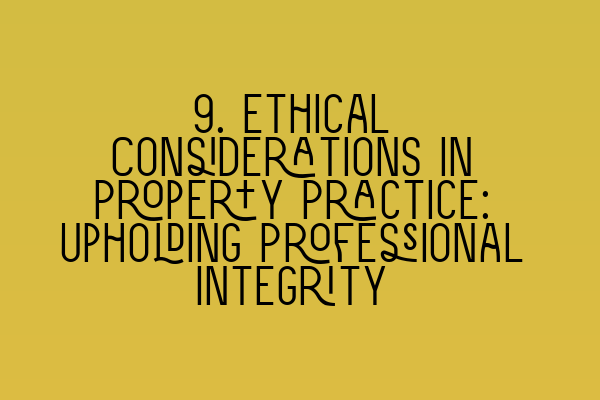Ethical Considerations in Property Practice: Upholding Professional Integrity
When practicing property law, upholding professional integrity is of utmost importance. As solicitors, we have a responsibility to our clients, the legal profession, and society as a whole. Professional ethics define how we conduct ourselves and guide us to make ethical decisions in our day-to-day work.
In this blog post, we will discuss nine ethical considerations that property practitioners should keep in mind to ensure they maintain professional integrity. These considerations are essential for both solicitors who are already established in the field and aspiring solicitors preparing for the SQE exams.
1. Confidentiality and Privacy
Maintaining confidentiality and privacy is crucial in property practice. Clients share sensitive information with their solicitors, trusting that it will be treated with the utmost confidence. As property practitioners, we must respect this trust and ensure that our clients’ personal and financial information remains confidential.
2. Conflict of Interest
Property practitioners often have to navigate potential conflicts of interest. It is essential to identify and address conflicts early on to protect the interests of all parties involved. By being transparent with clients and seeking their informed consent, we can maintain integrity and avoid any conflicts that may compromise our professional duties.
3. Honesty and Transparency
Property practice requires practitioners to be honest and transparent in all dealings. By providing accurate and complete information to clients, we build trust and maintain professional integrity. This includes disclosing any potential risks or drawbacks associated with property transactions.
4. Professional Competence
Being a property practitioner requires a high level of professional competence. It is essential to stay up-to-date with the ever-changing laws, regulations, and best practices in the field. By constantly improving our knowledge and skills, we can provide the best possible service to our clients and ensure their interests are protected.
5. Avoiding Unlawful Conduct
Maintaining professional integrity means strictly adhering to the law. Property practitioners should always act in accordance with legal and ethical standards, avoiding any involvement in unlawful conduct. This includes avoiding fraudulent activities, money laundering, or any other illegal practices that could tarnish the reputation of the legal profession.
6. Advocacy and Objectivity
As property practitioners, we are often called upon to advocate for our clients’ interests. However, it is important to do so in an objective and balanced manner. Maintaining objectivity is crucial to ensuring that our advice and representation are fair and unbiased. By prioritizing the interests of justice and equity, we can uphold professional integrity and act in the best interests of our clients.
7. Respect for Diversity and Inclusion
In property practice, we interact with clients from diverse backgrounds and cultures. It is essential to respect and value this diversity. By fostering an inclusive environment, we can provide equal and accessible services to all clients, regardless of their race, ethnicity, gender, sexual orientation, or any other characteristic. Promoting diversity and inclusion is not just a moral obligation; it is also a professional duty.
8. Client-Centered Approach
Clients rely on property practitioners for advice and guidance in complex legal matters. It is important to adopt a client-centered approach, putting their needs and interests at the forefront of our practice. By actively listening, empathizing, and communicating effectively with clients, we can build strong and trusting relationships. This client-centered approach ensures that we always act in their best interests, upholding professional integrity.
9. Continuing Professional Development
Professional integrity in property practice requires a commitment to ongoing learning and development. By participating in continuing professional development (CPD) programs, we can stay abreast of emerging trends, practices, and regulations in the field. CPD helps us enhance our expertise and maintain a high standard of professional competence, ensuring we provide the best possible service to our clients.
As property practitioners, upholding professional integrity is not just a legal and ethical obligation; it is also a fundamental aspect of building a successful and reputable practice. By following these nine ethical considerations, we can fulfill our responsibilities as solicitors and contribute to the overall integrity of the legal profession.
Looking to advance your property law knowledge? Check out our related articles:
– SQE 1 Practice Exam Questions
– SQE 1 Practice Mocks FLK1 FLK2
– SQE 2 Preparation Courses
– SQE 1 Preparation Courses
– SRA SQE Exam Dates
These resources will help you further develop your understanding of property law and prepare for the SQE exams. Remember, professional integrity is the foundation of a successful property practice, and continuous learning is key to maintaining that integrity.
